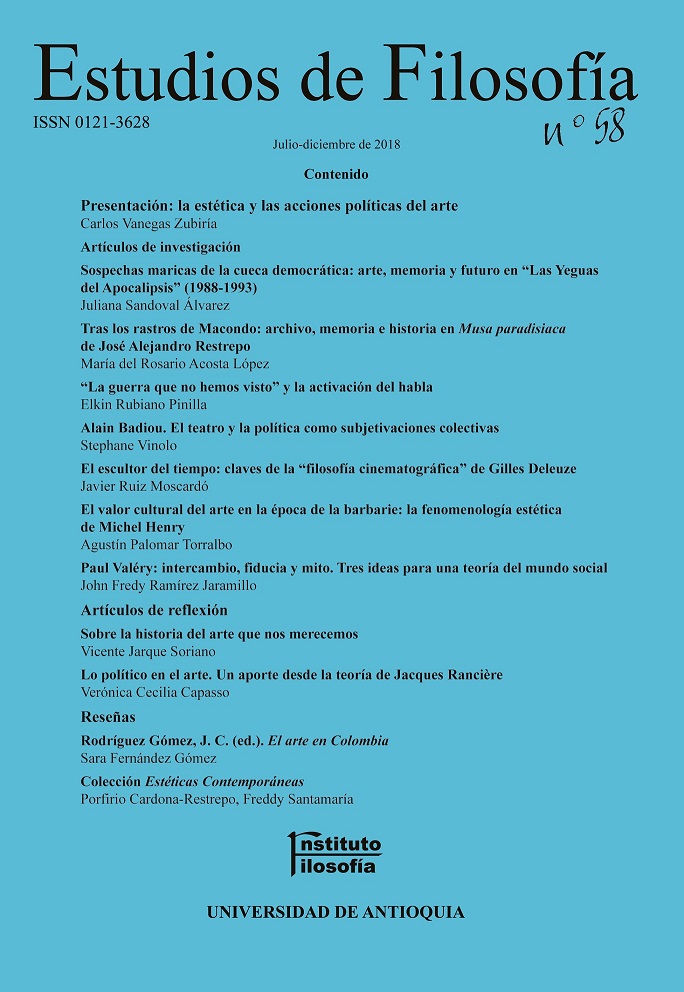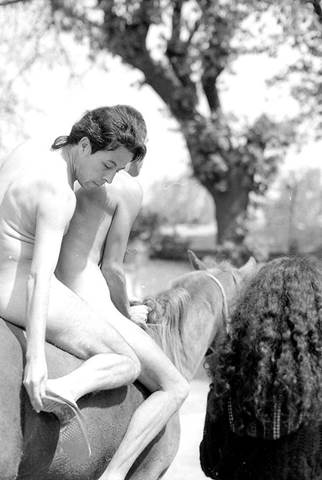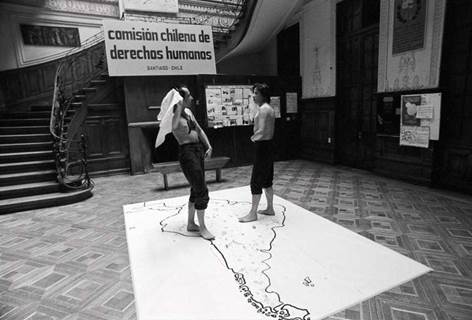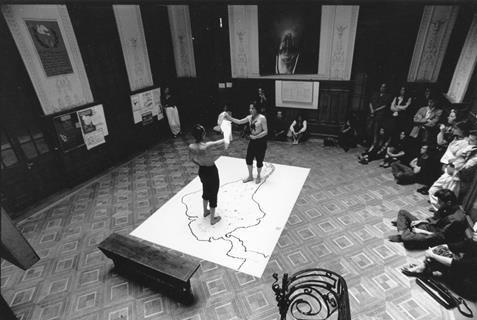Queer suspicions and the democratic cueca: art, memory and future in “Las Yeguas del Apocalipsis” (1988–1993)
DOI:
https://doi.org/10.17533/udea.ef.n58a02Keywords:
Las Yeguas del Apocalipsis, memory, Chile, art, transition, dictatorship, intersectionalityAbstract
This document aims to broaden the analysis of the work of the Chilean artistic duo “Las Yeguas del Apocalipsis” (formed by Pedro Lemebel and Francisco Casas), specifically in their relationship with the construction of Chile’s collective memory and future nation planning after Pinochet. Based on an approximation inspired by art sociology and in constant dialogue with central authors, this text proposes the introduction of “intersectionality” in order to further the comprehension of the strategic use made by the duo of the multiple marginal positionings they embodied. This analysis concludes that the artistic production of “Las Yeguas” concerned with “the memory question” posed a critical stance towards Chile’s past and its official instrumentalization in order to build a new future. Against this limited view, the duo proposed new memory exercises from an embodied militant difference, which aimed to include all outcasts in a truly democratic future.
Downloads
References
Anzandúa, G. (1998). Borderlands/La Frontera. The New Mestiza. San Francisco: Aunt Lute Book.
Avorgbedor, D. (1999). The Turner–Schechner Model of Performance as Social Drama: A Re–Examination in the Light of Anlo–Ewe ‘Haló. Research in African Literatures 30(4), 144–155. DOI: 10.1353/ral.2005.0026
Barraza, A. (2013). Francisco Casas y la mejor performance que se ha hecho en la historia de Chile. Fisuras S/N. Disponible en http://angelabarrazarisso.blogspot.com.co/2013/01/entrevistafranciscocasas.html
Brescia, M. (1989, octubre 17). “Las Yeguas del Apocalipsis” en una acción de arte. La Época, 26–27.
Brito, E. (2011). El cuerpo performático de los años 80. En M. Barría y F. Sanfuentes (Eds.), La intensidad del acontecimiento. Escrituras y relatos en torno a la performance en Chile (59–71). Santiago: Ediciones Departamento de Artes Visuales, Facultad de Artes Universidad de Chile.
Butler, J. (2012). Cuerpos en alianza y la política de la calle. Transversales 26: 1–18.
Carelli, G. (2011, enero 13). Pedro Lemebel; escribo con el pálpito urbano. El Clarín. Disponible en https://www.clarin.com/rn/literatura/Entrevista_Pedro_Lemebel_0_HJksMZuaDme.html
Carvajal, F. (2003, noviembre 7 y 8). Prácticas artísticas de la disidencia sexual y perturbaciones sobre los signos de la izquierda política [relatoría de la presentación en VII Jornadas de Jóvenes Investigadores], 1–18. Disponible en https://www.aacademica.org/000-076/217
Carvajal, F. (2012). Yeguas del Apocalipsis. La intrusión del cuerpo como desacato y desplazamiento. Carta 3: 60–62.
Carvajal, F. (2014). El duelo innombrado. Reseña de La Conquista de América en Perder la forma humana. Aletheia, 5(9), 1–8.
Connerton, P. (1989). How societies remember. Cambridge: Cambridge University Press.
Errázuriz, P. (1989). “La conquista de América”. Disponible en http://www. yeguasdelapocalipsis.cl/1989–la–conquista–de–america/
Freire, M. F. (2014). Territorios políticos, cuerpos politizados. Acerca del género en el arte de acción: Chile (1973–1992) (tesis de doctorado), Disponible en https://repositorio.uam.es/handle/10486/664025.
Gajardo, A. (1995, junio 2). De los escándalos a la escritura. La Época, 15.
Gómez, A. (1997, septiembre 21). Es necesario liberar algunas perversiones. La Tercera, 44.
Hooks, B. (1999). Yearning. Race, Gender, and Cultural Politics. Boston: South End Press.
Las Yeguas del Apocalipsis. (Agosto 1988). “Las Yeguas” Troykas: que no muera el sexo bajo los puentes. Revista Trauko 16, 19–20.
Lazzara, M. (2006). Chile in Transition: The Poetics and Politics of Memory. Florida: The University Press of Florida.
Lemebel, P. (1998). De perlas y cicatrices. Crónicas Radiales. Santiago de Chile: LOM Ediciones.
Lemebel, P. (2000). Loco afán. Crónicas del sidario. Barcelona: Anagrama.
Longoni, A., Davis, F., Carvajal, F., Gamarnik, C., La Rocca, M., y Laboureau, G. (2012, 26 y 27 de Octubre). Seminario Perder la forma humana. Una imagen sísmica de los años ochenta en América Latina [Relatoría seminario]. Disponible en http://ciacentro.org.ar/sites/default/les/perder_la_forma_humana_completo_corregido.pdf
Museo Nacional Centro de Arte Reina Sofía. (2012). Perder la forma humana: una imagen sísmica de los años ochenta en América Latina [Proyecto Expositivo]. Madrid, España: Museo Nacional Centro de Arte Reina Sofía.
Neira, E. (1999) Las estrategias del deseo. Rocinante No.9 Año II, s/p.
Neira, E. (1999, febrero 21). La metáfora de la subversión. El Mercurio, E12.
Nestaud, R. (2001). CADA DÍA: la creación de un arte social. Santiago de Chile: Editorial Cuarto Propio.
Nilo, U. (1988). “La Refundación de la Universidad de Chile”. Disponible en http://www.yeguasdelapocalipsis.cl/1989–refundacion–universidad–de– chile/
Novoa, S. (1996, septiembre 25). Lemebel se ríe del Sida: “Es la autodefensa de los homosexuales”. La Época, 28.
Oliveros, O. (2010, Septiembre 10). Francisco Casas acusa: “Me parece impactante que no existan trabajos de “Las Yeguas” en el Museo de la Memoria. ¡Eso es homofobia!”. El Mostrador. Disponible en http://www. elmostrador.cl/cultura/2013/09/10/me–parece–impactante–que–no–hay– trabajos–de–las–yeguas–en–el–museo–de–la–memoria–eso–es–homofobia/
Pini, I. (2009). “Memoria y violencia: reformulando relatos”. Ensayos. Historia y teoría del arte 16, 43–63.
Ramírez, E. (1989). “¿De qué se ríe presidente?”. Disponible en http://www. yeguasdelapocalipsis.cl/1990–de–que–se–rie–presidente/
Richard, N. (1989). Masculino/Femenino: prácticas de la diferencia y cultura democrática. Santiago: Francisco Zegers Editor.
Richard, N. (1998). Cultural Residues: Chile in Transition. Minneapolis: University of Minnesota Press.
Richard, N. (2007). Márgenes e instituciones. Arte en Chile desde 1973. Santiago de Chile: Ediciones Metales Pesados.
Risco, A. M. (1995, junio 18). “Escrito sobre ruinas”. La Nación, 16–17.
Robino, C. (1991, 26 de agosto–01 de septiembre). Las últimas locas del fin del mundo. Hoy, 42–45.
Robles, V. H. (2008). Bandera Hueca. Historia del movimiento homosexual en Chile. Santiago: Editorial Arcis y Editorial Cuarto Propio.
Salas, F. (1989, mayo 1). Las Yeguas del Apocalipsis. Cauce, 26–29.
Schechner, R. (2006). Performance Studies. An introduction. New York: Routledge.
Taylor, D. (2005). El espectáculo de la memoria: trauma, performance y política. Hemispheric Institute, Nueva York, 2005, s/n p: 4–6.
Taylor, D. (2006). Trauma and Performance: Lessons from Latin America. PMLA 121, No. 5: 1674–1677.
Taylor, D. (2011). Introducción. Performance, teoría y práctica. En D. Taylor y M. Fuentes (Eds.), Estudios avanzados de performance: (7–31). México D.F.: Fondo de Cultura Económica.
Wilde, A. (2007). Irrupciones de la memoria: la política expresiva en la transición hacia la democracia en Chile. En H. Pons (Ed.), Chile: los caminos de la historia y la memoria (1–42). Santiago de Chile: Anne Perotin Dummon.
Williams, K. (2016, octubre 26–28). The Urgency of Intersectionality (TEDTalk en TEDWomen 2016]. Disponible en https://www.ted.com/talks/kimberle_crenshaw_the_urgency_of_intersectionality/transcript
Published
How to Cite
Issue
Section
Categories
License
Copyright (c) 2018 Juliana Sandoval Álvarez

This work is licensed under a Creative Commons Attribution-NonCommercial-ShareAlike 4.0 International License.
Authors who publish with this journal agree to the following terms:
1. The Author retains copyright in the Work, where the term "Work" shall include all digital objects that may result in subsequent electronic publication or distribution.
2. Upon acceptance of the Work, the author shall grant to the Publisher the right of first publication of the Work.
3. The Author shall grant to the Publisher a nonexclusive perpetual right and license to publish, archive, and make accessible the Work in whole or in part in all forms of media now or hereafter known under a Creative Commons Attribution-NoCommercia-ShareAlike (CC BY-NC-SA 4.0), or its equivalent, which, for the avoidance of doubt, allows others to copy, distribute, and transmit the Work under the following conditions: (a) Attribution: Other users must attribute the Work in the manner specified by the author as indicated on the journal Web site;(b) Noncommercial: Other users (including Publisher) may not use this Work for commercial purposes;
4. The Author is able to enter into separate, additional contractual arrangements for the nonexclusive distribution of the journal's published version of the Work (e.g., post it to an institutional repository or publish it in a book), as long as there is provided in the document an acknowledgement of its initial publication in this journal;
5. Authors are permitted, and Estudios de Filosofía promotes, to post online the preprint manuscript of the Work in institutional repositories or on their Websites prior to and during the submission process, as it can lead to productive exchanges, as well as earlier and greater citation of published work (see The Effect of Open Access). Any such posting made before acceptance and publication of the Work is expected be updated upon publication to include a reference to the Estudios de Filosofía's assigned URL to the Article and its final published version in Estudios de Filosofía.



















